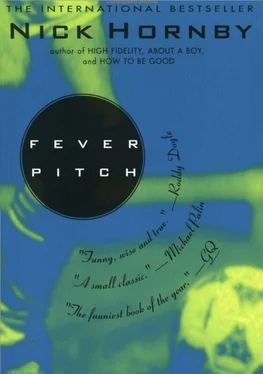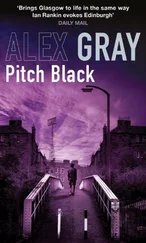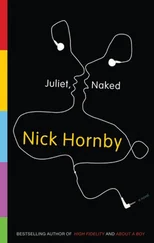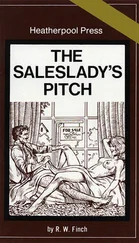We never did replace him satisfactorily, but we found different people, with different qualities; it took me a long time to realise that this is as good a way of coping with loss as any.
WEST HAM v ARSENAL
10.5.80
Everyone knows the song that Millwall fans sing, to the tune of “Sailing”: “No one likes us/No one likes us/No one likes us/We don’t care.” In fact I have always felt that the song is a little melodramatic, and that if anyone should sing it, it is Arsenal. Every Arsenal fan, the youngest and the oldest, is aware that no one likes us, and every day we hear that dislike reiterated. The average media-attuned football fan—someone who reads a sports page most days, watches TV whenever it is on, reads a fanzine or a football magazine—will come across a slighting reference to Arsenal maybe two or three times a week (about as often as he or she will hear a Lennon and McCartney song, I would guess). I have just finished watching Saint and Greavsie , during the course of which Jimmy Greaves thanked the Wrexham manager for “delighting millions” with the Fourth Division team’s victory over us in the FA Cup; the cover of a football magazine kicking around in the flat promises an article entitled “Why does everyone hate Arsenal?” Last week there was an article in a national newspaper attacking our players for their lack of artistry; one of the players thus abused was eighteen years old and hadn’t even played for the first team at the time.
We’re boring, and lucky, and dirty, and petulant, and rich, and mean, and have been, as far as I can tell, since the 1930s. That was when the greatest football manager of all time, Herbert Chapman, introduced an extra defender and changed the way football was played, thus founding Arsenal’s reputation for negative, unattractive football; yet successive Arsenal teams, notably the Double team in 1971, used an intimidatingly competent defence as a springboard for success. (Thirteen of our league games that year ended nil-nil or 1-0, and it is fair to say that none of them were pretty.) I would guess that “Lucky Arsenal” was born out of “Boring Arsenal”, in that sixty years of 1-0 wins tend to test the credulity and patience of opposing fans.
West Ham, on the other hand, like Tottenham, are famous for their poetry and flair and commitment to good, fluent (“progressive”, in the current argot, a word which for those of us in our thirties is distressingly reminiscent of Emerson, Lake and Palmer and King Crimson) football. Everyone has a soft spot for Peters and Moore and Hurst and Brooking and the West Ham “Academy”, just as everyone loathes and despises Storey and Talbot and Adams and the whole idea and purpose of Arsenal. No matter that the wild-eyed Martin Allen and the brutish Julian Dicks currently represent the Hammers, just as Van Den Hauwe and Fenwick and Edinburgh represent Spurs. No matter that the gifted Merson and the dazzling Limpar play for Arsenal. No matter that in 1989 and 1992 we scored more goals than anyone else in the First Division. The Hammers and the Lilleywhites are the Keepers of the Flame, the Only Followers of the True Path; we are the Gunners, the Visigoths, with King Herod and the Sheriff of Nottingham as our twin centre-halves, their arms in the air appealing for offside.
West Ham, Arsenal’s opponents in the 1980 Cup Final, were in the Second Division that season, and their lowly status made people drool over them even more. To the nation’s delight, Arsenal lost. Saint Trevor of England scored the only goal and slew the odious monster, the Huns were repelled, children could sleep safely in their beds again. So what are we left with, us Arsenal fans, who for most of our lives have allowed ourselves to become identified with the villains? Nothing; and our sense of stoicism and grievance is almost thrilling.
The only things anyone remembers about the game now are Brooking’s rare headed goal, and Willie Young’s monstrous professional foul on Paul Allen, just as the youngest player to appear in a Cup Final was about to score one of the cutest and most romantic goals ever seen at Wembley. Standing on the Wembley terraces among the silent, embarrassed Arsenal fans, deafened by the boos that came from the West Ham end and the neutrals in the stadium, I was appalled by Young’s cynicism.
But that night, watching the highlights on TV, I became aware that a part of me actually enjoyed the foul—not because it stopped Allen from scoring (the game was over, we’d lost, and that hardly mattered), but because it was so comically, parodically Arsenalesque . Who else but an Arsenal defender would have clattered a tiny seventeen-year-old member of the Academy? Motson or Davies, I can’t remember which, was suitably disgusted and pompous about it all; to me, sick of hearing about how the goodies had put the baddies to flight, his righteousness sounded provocative. There was something about it that reminded me of Bill Grundy winding up the Sex Pistols on television in 1976 and then expressing his outrage about their behaviour afterwards. Arsenal, the first of the true punk rockers: our centre-halves were fulfilling a public need for harmless pantomime deviancy long before Johnny Rotten came along.
ARSENAL v VALENCIA
14.5.80
Football teams are extraordinarily inventive in the ways they find to cause their supporters sorrow. They lead at Wembley and then throw it away; they go to the top of the First Division and then stop dead; they draw the difficult away game and lose the home replay; they beat Liverpool one week and lose to Scunthorpe the next; they seduce you, half-way through the season, into believing that they are promotion candidates and then go the other way … always, when you think you have anticipated the worst that can happen, they come up with something new.
Four days after losing one cup final, Arsenal lost another, to Valencia in the European Cup-Winners Cup, and the seventy-game season came to nothing. We outplayed the Spanish team, but couldn’t score, and the game went to penalties; Brady and Rix missed theirs (some say that Rix was never the same again after the trauma of that night, and certainly he never recaptured his form of the late seventies, even though he went on to play for England), and that was that.
As far as I am aware, there isn’t another English club that has lost two finals in a week, although in the years to come, when losing in a final was the most that Arsenal supporters dared to hope, I wondered why I felt quite so stricken. But that week also had a beneficially purgative side effect: after six solid weeks of semi-finals and finals, of listening to the radio and looking for Wembley tickets, the football clutter was gone and there was nothing with which to replace it. Finally I had to think about what I was going to do, rather than what the Arsenal manager was going to do. So I applied for teacher training college back in London, and vowed, not for the last time, that I would never allow football to replace life completely, no matter how many games Arsenal played in a year.
ARSENAL v SOUTHAMPTON
19.8.80
The first match of the season, so you’re always that bit keener to get along. And over the summer there was an extraordinary bit of transfer business, when we bought Clive Allen for a million pounds, didn’t like the look of him in a couple of preseason friendlies, and swapped him for Kenny Sansom (a striker for a full-back; that’s the Arsenal way) before he’d even played a game. So even though Liam had gone, and Southampton were not the most attractive of opponents, there was a forty-thousand-plus crowd.
Читать дальше











